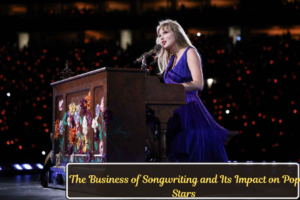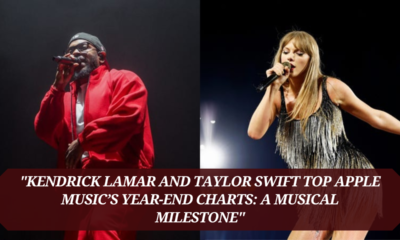Entertainment
Does Your Favorite Pop Star Write Her Own Songs? Thank Taylor Swift
Published
1 month agoon
By
divya
The question of whether pop stars truly write their own songs is one that has often sparked debates among music fans, industry insiders, and critics alike. The era of cookie-cutter pop hits, manufactured by teams of songwriters and producers, has made it increasingly difficult to discern the level of personal artistry behind some of the biggest chart-topping singles. However, there is one pop star who has consistently defied these trends and set a standard for self-expression in pop music: Taylor Swift.
From her country music origins to her present-day pop superstardom, Taylor Swift’s journey as a singer-songwriter has become a defining narrative of her career. Swift is celebrated not only for her vocal talent and compelling stage presence but also for her role as a true creator of her own music. Unlike many of her peers in the industry, who rely on teams of songwriters and producers to craft their material, Swift has built a reputation for writing (and co-writing) the majority of her own songs. But what does this mean for the broader pop music landscape? And how has Taylor Swift’s approach to songwriting influenced both her success and the way we view pop music in general?
In this article, we will explore the significance of Taylor Swift’s role as a songwriter, how her approach has shaped the pop music industry, and the larger cultural implications of her artistry.

The Birth of a Songwriter
When Taylor Swift entered the music scene in 2006 with her self-titled debut album, few people could have predicted just how much of an impact she would have on the industry. At the time, she was a fresh-faced 16-year-old country singer with a raw, heartfelt sound that resonated with young listeners. However, what set her apart from many of her contemporaries was her remarkable ability to write songs that felt deeply personal and authentic. Swift wrote or co-wrote every track on her debut album, a feat that would become a hallmark of her entire career.
With songs like “Tim McGraw,” “Teardrops on My Guitar,” and “Our Song,” Swift established herself as a songwriter who wasn’t afraid to share her own experiences, vulnerabilities, and emotions with the world. These early songs spoke to universal themes like love, heartbreak, and self-discovery, but they did so with a level of specificity and detail that made them feel uniquely Taylor’s. This level of honesty and transparency was not only refreshing but also rare in a genre where many young artists relied on outside writers to craft their songs for them.
As Swift transitioned into the pop realm with her 2014 album *1989*, her songwriting skills only continued to evolve. Tracks like “Shake It Off” and “Blank Space” proved that she was capable of writing hit songs that not only dominated the charts but also displayed her growth as a lyricist and storyteller. Unlike many pop stars who rely on teams of songwriters to create their material, Swift took an active role in the songwriting process for *1989*, working with collaborators like Max Martin and Shellback to refine her vision while maintaining full creative control over the content. Her ability to craft memorable melodies and clever lyrics, all while staying true to her personal experiences, set her apart from many of her contemporaries.

The Role of Songwriting in Taylor Swift’s Success
Taylor Swift’s songwriting prowess is arguably one of the biggest reasons for her success. In a music industry often dominated by catchy hooks and carefully crafted beats, Swift has built a career on the strength of her storytelling ability. She’s not just writing songs; she’s creating vivid narratives that connect with her listeners on a deeply emotional level.
One of the key elements of Swift’s songwriting is her ability to blend personal experiences with universal themes. Whether she’s reflecting on a past relationship, navigating her rise to fame, or exploring the complexities of friendship, Swift has a remarkable ability to craft songs that feel both deeply personal and broadly relatable. Songs like “All Too Well,” “Lover,” and “The Archer” illustrate her exceptional talent for using music as a vehicle for storytelling. She’s able to take specific moments from her own life and turn them into something that resonates with people from all walks of life.
What makes Swift’s songwriting stand out is not just the content of her lyrics but also her approach to melody and structure. She has consistently proven that pop music doesn’t have to be superficial or formulaic. Her songs are often layered with intricate melodies, shifting dynamics, and emotionally charged choruses that elevate them beyond typical pop fare. In this sense, Swift’s songwriting represents a fusion of artistic integrity and commercial success—two qualities that are often seen as mutually exclusive in the modern music industry.
Moreover, Swift’s ability to evolve her sound while staying true to her roots has allowed her to maintain a loyal fan base throughout her career. While her early country-influenced albums were rooted in acoustic instrumentation and storytelling, she seamlessly transitioned to a more synth-heavy, pop-oriented sound without losing the essence of what made her songs special: their vulnerability and authenticity.

Taylor Swift’s Influence on the Pop Music Landscape
Taylor Swift’s approach to songwriting has had a profound impact on the music industry. Her success has demonstrated that pop music can be both commercially successful and artistically meaningful. By writing her own songs, Swift has helped to pave the way for other artists to take control of their creative output, proving that it is possible to maintain artistic integrity while achieving mainstream success.
Swift’s influence can be seen in the growing number of pop artists who write or co-write their own material. In the past, it was not uncommon for pop stars to rely heavily on external songwriters and producers to create their hits. However, as the music industry has shifted toward a more DIY approach, with artists having greater access to recording technology and platforms for self-promotion, many newer artists are taking a more active role in the creative process.
Artists like Lorde, Billie Eilish, Olivia Rodrigo, and Halsey have followed in Swift’s footsteps by writing or co-writing the majority of their songs, blending personal narratives with mainstream pop sensibilities. Much like Swift, these artists have shown that it is possible to maintain artistic authenticity while achieving commercial success. By writing their own songs, they have created music that speaks to their personal experiences while also resonating with a wide audience.
While Taylor Swift was not the first pop star to write her own songs, she is undoubtedly one of the most influential figures in making self-authored pop music a viable career path. Her success has encouraged a new generation of artists to embrace their creative power and take control of their careers, signaling a shift away from the “manufactured pop star” model that once dominated the charts.

The Business of Songwriting and Its Impact on Pop Stars
One of the key factors behind Taylor Swift’s success as a songwriter is her ability to take ownership of her music. In an industry where songwriters and producers often hold significant power over an artist’s work, Swift has been adamant about maintaining control over her creative output. She famously fought for the rights to her masters when her former label, Big Machine Records, sold her catalog to Scooter Braun’s Ithaca Holdings in 2019. This highly publicized battle was a testament to Swift’s commitment to protecting her music and her artistry, as well as her understanding of the business side of the music industry.
By owning her songs, Swift has been able to maintain control over how her music is used, how it’s distributed, and how it is monetized. This has allowed her to make critical decisions about the direction of her career, such as re-recording her early albums in order to regain control over her masters. Her decision to re-record her music was not only a bold business move but also a statement about the importance of artistic ownership in an industry that often prioritizes profits over the rights of creators.
This level of control has also allowed Swift to experiment with her sound and songwriting in ways that other pop stars may not be able to. She has the freedom to write about whatever she chooses, whether it’s personal experiences, societal issues, or fictional narratives. This sense of creative freedom has enabled her to stay at the forefront of pop music, consistently pushing the boundaries of what is possible within the genre.

Taylor Swift’s Legacy as a Songwriter
As Taylor Swift continues to evolve as an artist, her legacy as a songwriter is only becoming more pronounced. In an era where the line between authenticity and artifice can often blur, Swift has remained a beacon of self-expression, using her personal experiences as the foundation for much of her music. Her ability to craft songs that are both emotionally raw and universally relatable has set her apart from many other pop stars, solidifying her place as one of the greatest songwriters of her generation.
But beyond her musical achievements, Swift’s influence extends to the broader cultural landscape. She has shown that being a successful pop star doesn’t mean sacrificing creative control or authenticity. In doing so, she has inspired countless artists to take ownership of their music and their careers, shifting the power dynamics within the music industry and giving artists more agency over their own narratives.
As the music industry continues to evolve, it is clear that Taylor Swift will remain a defining figure in the conversation about songwriting and artistry in pop music. Whether she’s crafting a deeply personal ballad or a catchy pop anthem, her commitment to writing her own songs has set a standard for what it means to be a true pop star—and has made her one of the most influential artists of the 21st century.
In conclusion, Taylor Swift’s approach to songwriting has had a profound impact on both her career and the wider pop music industry. By writing her own songs, Swift has shown that pop music can be both commercially successful and artistically meaningful. Her authenticity, vulnerability, and mastery of storytelling have set her apart from her peers, and her influence has helped pave the way for other artists to take control of their creative output.
You may like
-


“Kendrick Lamar and Taylor Swift Top Apple Music’s Year-End Charts: A Musical Milestone”
-


“Taylor Swift Tops Spotify Wrapped 2024 as Most Streamed Artist of the Year”
-


“Taylor Swift’s Compassionate Gesture Towards ‘Tonight Show’ Ex-Host”
-


Taylor Swift and Andrea Swift at Chiefs Game After Travis Kelce Backs Her Eras Tour Performance
-


Taylor Swift’s ‘1989 (Taylor’s Version)’ Anniversary Celebration This Week
-


Taylor Swift Fans Speculate ‘Reputation’ Re-Release Is Coming Sooner Than Anticipated
